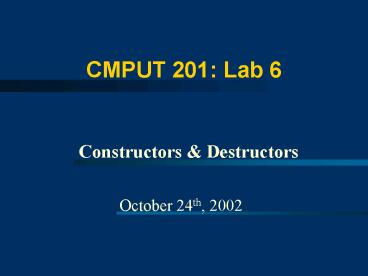CMPUT 201: Lab 6 - PowerPoint PPT Presentation
1 / 12
Title: CMPUT 201: Lab 6
1
CMPUT 201 Lab 6
Constructors Destructors
October 24th, 2002
2
Constructors
- When using C-style structs, you must remember
to initialize every field in a dedicated function
after declaration - This is error-prone you might forget to do
this - When using C classes, you can write a special
function called a Constructor that gets called
every time an object of that class is created - In the Constructor, you can initialize the
objects variables in the appropriate manner so
declaration and initialization are done in one
line
3
Declaration of Constructors
- Constructors always have the same name as the
class and must not return anything - You can have multiple constructors for a class,
each of which initializes a new objects
variables in a different way - Constructors that take arguments are called
Value Constructors - A constructor that takes no arguments is called
the Default Constructor (only one per class)
4
Declaration of Constructors
- Consider the following class in hobbit.h
- class Hobbit public // Default
constructor Hobbit() // Value
constructors Hobbit(char hname)
Hobbit(int hp, int st) Hobbit(char hname,
int hp, int st)private char name16
int health_points int stamina
5
Implementation of Constructors
- Constructors are implemented in hobbit.cpp
- // Creates a new hobbit and initializes its
nameHobbitHobbit(char hname) name new
char strlen(hname) 1 strcpy(name,
hname)// Creates a new hobbit and
initializes its health and stamina// Uses an
alternative mechanism for doing
soHobbitHobbit(int hp, int st)
health_points(hp), stamina(st)
6
Constructor Invocation
- Constructors are invoked in three cases
- 1. When you declare an object
- // calls first value constructorHobbit
hob1(frodo) // calls default
constructorHobbit hobPtr new Hobbit - When you create a new object and assign it to an
existing variable - Creature c1...// calls third value
constructorc1 Hobbit(samwise,40,50)
7
Constructor Invocation
- When you pass an object to a function by value
- promoteLevel(hob1)
- Passing an object by value to a function invokes
a special constructor called the Copy Constructor
(only one per class) - The Copy Constructor takes one reference argument
that is the same type as the class - HobbitHobbit( const Hobbit source )
- name source.name
- health_points source.health_points
- stamina source.stamina
8
Passing User-Defined Objects by Value
- When an argument is passed by value, a local
variable of the given type is created in the
invoked function - The variable is initialized with the value of the
corresponding argument in the function call - // in main function
- Hobbit hob1(frodo)
- ...
- // frodo is passed by value
- promoteLevel( hob1 )
9
Passing User-Defined Objects by Value
- // in another part of the code
- promoteLevel( Hobbit hobToPromote ) ...
- A new Hobbit object hobToPromote is created
- and initialized with the object hob1
- The argument binding in the above function is
equivalent to - Hobbit hobToPromote hob1
- The particular constructor called depends on what
the local variable is initialized with
10
The Assignment Operator
- Useful to overload the assignment operator
when you wish to assign one instance of a class
to another - The assignment statement has the form hob3
hob1 - Where hob3 and hob1 are existing objects of
type Hobbit - Initialization is not the same as assignment
since a new object is being created in the first
case and an existing redefined in the second case
11
Destructors
- In the example class, there was a private
instance variable of type char, which means the
programmer cannot access it and do a delete - The Destructor function handles this
- A Destructor is a special function that gets
invokes when an object leaves scope - Destructors have the same name as the class
preceded by a tilda and must not return
anything
12
Declaration Implementation of Destructor
- In hobbit.h
- Class Hobbit public // Default
constructor Hobbit() ... - // Destructor Hobbit() ...
- In hobbit.cpp
- HobbitHobbit() // return dynamic memory
associated // with the name field
delete(name) health_points -1 stamina
-1
The Destructor is called at the end of a
functionwith a local variable of type Hobbit
or when the programmer issues a delete hob1
command































